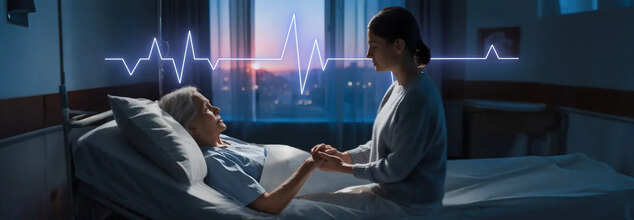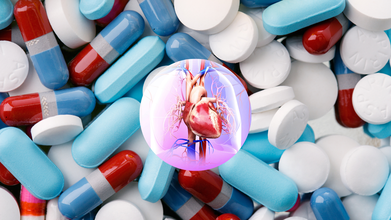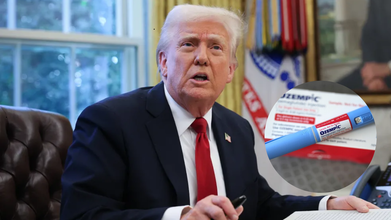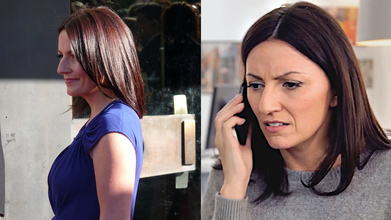- Health Conditions A-Z
- Health & Wellness
- Nutrition
- Fitness
- Health News
- Ayurveda
- Videos
- Medicine A-Z
- Parenting
- Web Stories
Life At Any Cost: Why We Fight To Prolong Life But Question The Idea To Ease Death?

There are certain kinds of suffering that cannot be fully described in any language. Seeing someone you love disintegrate slowly- body, mind, and soul compels you to an emotional limbo in which hope, love, and sorrow get mixed up painfully. I lived through this experience with my paternal uncle, once a towering 6’2” figure of energy and wit, suffered a debilitating brain stroke. For the next seven years, our family watched him shrink, not just physically but in every possible way. A man who once lit up rooms became bed-bound, barely conscious, and unrecognizable. His laughter, once infectious, was replaced by silent gasps and spasms. His wife, my aunt, aged a decade in two years. The entire household lived in suspended animation, haunted by guilt, torn by duty, and plagued by helplessness.
Another tragedy was of a young daughter, in her late 30s, who had given every fiber of her existence to nursing her disease-stricken father, bedridden. Despite all efforts, he fell into a long, agonizing decline. One evening, with shaking hands and crying eyes, she admitted, "I prayed to God to take him. I couldn't stand to watch him suffer anymore." I despised myself for it, but I couldn't help it." That instant summed up a silent truth that went unspoken: when does the need to preserve life become the desire to permit a peaceful death?
As these stories reveal, there are moments where death is not a villain but a long-awaited release. This perspective fuels the growing global debate on euthanasia and assisted dying. Though often used interchangeably, these terms bear crucial legal and ethical distinctions.
Euthanasia is where there is a third party usually a physician actively performing actions to put an end to a patient's life to cure suffering. Where it is performed at the request of the patient, it's referred to as voluntary euthanasia.
Assisted suicide means assisting someone in ending their life, often with prescribed lethal drugs. The difference here is that the patient carries out the final action.
Assisted dying is a more general term and frequently used when policy or advocacy is involved. It could mean either of the above, though certain groups reserve it to describe assisted suicide for patients with terminal conditions.
Yet another practice of end-of-life care, palliative sedation, permits profound sedation all the way to death for those who are suffering unbearable distress. Not considered legal euthanasia, yet having its ethics dangerously close, it remains at the center of much philosophical argumentation.
In countries such as the UK, these acts are still illegal. Assisting suicide can bring a maximum of 14 years in prison, and euthanasia can be considered murder. Yet, actions such as withholding treatment from terminal or vegetative patients — often referred to as passive euthanasia — are permitted.
Stories That Stir the Debate: Dignity and Choice
The strongest arguments for or against assisted death are not in legal documents but in living testimonials.
One of the cases that stirred international headlines was that of Noa Pothoven, a 17-year-old Dutch woman who had been afflicted with extreme mental illness, including anorexia and depression. Early media accounts misrepresented her death as a case of legal euthanasia. Actually, she starved to death and dehydrated under medical supervision, and her physicians, in respect for her autonomy, did not act to stop it.
Noa had endured years of intense PTSD, depression, and anorexia, stemming from violent sexual abuse. Following several hospitalizations and efforts to manage her mental illness, she made the heartbreaking choice to withhold food and fluids—a legal option in the Netherlands.
Unlike the media accounts, her death was not due to physician-assisted euthanasia, but voluntary withdrawal of treatment. Her doctors and family respected her wish to discontinue interventions, upholding her autonomy in the face of their own grief.
This case highlights how mental distress, as with physical pain, can propel people towards death—not on impulse, but with deliberate intent. It also reveals how misinformation can taint ethical debate.
In another dramatic case, Louise Shackleton candidly discussed taking her husband, Anthony, to Switzerland, where he opted to die at Dignitas. Anthony had advanced motor neuron disease and had lost his bodily functions over the course of years.
"He didn't have choices. What he desired was nothing more than a good death," Louise told in a moving interview.
Upon returning to the UK, she turned herself in, knowing full well the legal consequences of assisting a suicide and yet had no regrets. “I loved him. He was my husband. I was with him until the end.”
Her story brings forward an essential question: If we can choose how we live, should we not also have the right to choose how we die?
When her husband Anthony, a renowned furniture restorer, was diagnosed with motor neuron disease, he rapidly lost the capacity to live independently. "He didn't want to be in a bed unable to move, unable to even turn his head," Louise said to Sky News. They talked about his end-of-life choices over two years.
Anthony eventually went for Dignitas in Switzerland. Louise accompanied him there, remained with him, and saw him pass away peacefully—unencumbered by the physical prison his sickness had constructed around him.
When she returned to the UK, Louise turned herself in to the authorities for helping him commit suicide—legally a crime. But she stands firm on her position. "He was my husband and I loved him. I helped him find peace."
As more and more support it, assisted dying is still one of the most debated ethical challenges today. Critics have legitimate points — risk of coercion, dignity of human life, and the risk of exploitation of the vulnerable. Especially where mental illness comes into play, critics contend that wanting to die may be symptomatic, rather than a choice.
Yet, supporters point out that tight controls, psychiatric assessments, and medical screening are already the cornerstone of current legislation in legal states. It's a matter of dignity, choice, and humane relief not harm for them.
Joseph Awuah-Darko, a British-Ghanaian artist aged 28 and residing in the Netherlands, has taken an unimaginably courageous step: after years of struggling with severe bipolar disorder, he has opted to seek euthanasia. His is not a tale of hopelessness, but of profound emotional introspection, strength, and a quest for human contact amidst chronic mental suffering.
Diagnosed with bipolar disorder, a mental condition that triggers savage mood swings between manic highs and depressive lows—Joseph has spent years struggling through a mental health system that, no matter how hard he tried, never provided him with lasting relief. The emotional burden of his experience weighed so heavily on him that he made the agonizing decision to seek out medically assisted death, a legal possibility in the Netherlands under strict guidelines.
In a tearful Instagram video released in December, Joseph explained, "I'm Joseph, I am bipolar and I moved to the Netherlands to legally end my life."
In brutal candor and chilling vulnerability, he explained how every morning starts with "severe pain." It took him five years of thinking before he submitted his official request to the Euthanasia Expert Centre. It can take four years to get approval, a timeline that reflects the seriousness and stringency of the process.
"I am NOT special," he penned. "Like a lot of folks in their 20s; the ongoing burnout, debt, paralysing depression, violent media cycle and the dystopian truth of AI … all bear heavily." For Joseph, these meals are not simply sustenance—they are acts of presence, community, and comfort in the late hours of his narrative.
What Doctors Think?
Curing isn't always healing. Sometimes it's just relieving pain. Sometimes, restoring dignity. Sometimes, it simply is releasing — with grace, with peace, with control. For the sick who suffer without respite — physically or emotionally — the freedom to choose a death with dignity can be as therapeutic as any miracle medicine.
Dr. Tonmoy Sharma, Psychiatrist & Neuroscientist shares, "Choosing to die is not always driven by depression or emotional crisis. In many cases, especially where assisted dying is legal, it is a deliberate and carefully considered decision. These are often made by individuals with terminal illnesses or degenerative conditions who retain full mental capacity. These people may not be clinically depressed, but they are suffering in a way that no treatment can relieve, and they want control over how and when their life ends."
Dr Tonmoy further answers the pivotal question about why some people feel so helpless from their sufferings that they no longer want to live. "This question takes on different meanings depending on whether someone is experiencing mental illness or facing irreversible physical decline."
"In cases of terminal physical illness or chronic, untreatable conditions, helplessness often stems from the loss of control over one's body and the erosion of dignity. These individuals are not seeking death because they feel worthless or unloved, they may have supportive families and full access to care. Rather, they seek assisted dying because the suffering is constant and unrelenting, and they wish to preserve autonomy over the remainder of their life," adds Dr Tonmoy.
"On the other hand, when people experiencing clinical depression feel helpless, their thoughts may be clouded by negative thinking patterns—a symptom of the illness itself. These individuals may feel hopeless or burdensome, even when they are not. Their suffering is real, but it is often reversible with proper treatment."
While caregivers—whether family or professionals, witness suffering up close. In many cases, it’s the person who is ill who initiates the conversation about assisted dying. Families often need time to come to terms with this decision, even when it comes from a place of clarity, not despair.
Dr Tonmoy explains, "For loved ones, the idea of a planned death can feel unnatural. They may struggle with guilt, sadness, or confusion, not because they don’t understand, but because letting go is never easy. Often, the person must gently convince their family, helping them see that the decision is not about giving up, but about preserving dignity."
"Despite all this, many caregivers ultimately stand by their loved one’s decision. Still, they carry their own burdens and deserve support as they navigate the complex emotional journey that comes with love, loss, and end-of-life care."
As medicine progresses, it is more and more possible to lengthen life. But the question of ethics persists: At what expense? If healing is also the cessation of suffering — both for patients and their caretakers then perhaps, in carefully examined instances, assisted death can really be an act of love, not defeat.
Where the World Stands on Legal Assisted Dying?
As the world continues to wrestle with the morality of assisted dying, a number of nations have proceeded with legalization, usually in stringent conditions. Here is where the world legal landscape stands:
United States
Ten states and the District of Columbia permit physician-assisted dying under statutes that generally cover terminally ill patients with fewer than six months to live. Oregon, the first to make it legal in 1997, mandates strict consent procedures. While narrow in scope, it recognizes the dignity of those to be inevitably killed.
Canada
Canada's "Medical Assistance in Dying" (MAiD) law started in 2016 and has since grown. It started out being reserved for individuals with foreseeable death but now covers patients with grievous and irremediable illnesses, although a planned expansion to cover mental illness was delayed until 2027.
The Netherlands and Belgium
Both countries allow euthanasia and assisted suicide under strict conditions, including unbearable suffering with no prospect of improvement. Belgium even permits minors to request euthanasia, provided there’s parental consent.
Switzerland
Home to Dignitas, Switzerland has allowed assisted dying since 1942, provided there's no selfish motive. Foreign nationals can legally access services here, leading to the controversial concept of “suicide tourism.”
Australia and Spain
Both countries allow voluntary assisted dying for terminally ill patients. Australia has stringent state-by-state rules, while Spain provides euthanasia and assisted suicide through its national legislation enacted in 2021.
Dr. Tonmoy Sharma is a Psychiatrist & Neuroscientist, CEO of Merlin Health in India
Five Every Day Drugs That Could Negatively Impact Your Heart, According To Doctor

Credits: Canva
Every medicine has its own set of side effects, and Dr Dmitry Yaranov, a Russia-based cardiologist, who specializes in heart failure, advanced heart failure, heart transplantation, and mechanical circulatory support, says that some everyday drugs can pose hidden risks to the heart. His message is not meant to spark fear but to encourage awareness about medications we often assume are completely harmless.
Below are five categories of common drugs that Dr. Yaranov believes deserve more caution, especially for those with existing heart issues.
NSAIDs - Nonsteroidal Anti-inflammatory Drugs
These are your everyday painkillers, which includes ibuprofen or naproxen. While they are go-to options for headaches, fever, or muscle cramps, Dr Yaranov says that its frequent use could strain the heart.
These drugs reduce inflammation by blocking certain chemical pathways, but they also make the body retain salt and water. This can:
- Raise blood pressure
- Worsen swelling
- Increase the risk of heart failure, particularly in people who already have high blood pressure or heart disease
Dr. Yaranov suggests discussing long-term or frequent NSAID use with a doctor, instead of using them casually.
Chemotherapy Drugs
While these drugs are life-saving, it may have side effects that could weaken the heart muscles. Dr Yaranov explains that drugs like doxorubicin or trastuzumab could also affect how well the heart pumps blood, which can lead to ardiomyopathy or heart failure.
Because of this, many cancer centres now include routine heart monitoring before, during, and after chemotherapy. The goal is to fight cancer without compromising long-term heart health.
Stimulant Medicines For ADHD
Stimulants that contain amphetamines help improve focus and alertness, but Dr. Yaranov warns that they can also:
- Increase heart rate
- Raise blood pressure
- Trigger arrhythmias
Elevate the risk of heart attack in people who have underlying heart issues
He stresses that misuse or unsupervised use is especially dangerous. Even for those who take them as prescribed, regular follow-ups with a doctor are important.
Older Diabetes Medications
Managing diabetes could mean being on medicines for lifelong. Yaranov points out that older drugs like rosiglitazone can increase the risk of heart failure despite effectively lowering blood sugar. Because of these concerns, many doctors now prefer newer diabetes medications that also support cardiovascular health. However, patients should never switch or stop medicines without medical guidance.
Common Cold Medicines
Thanks to allergens and climate change, common cold now stays all around the year, which means you will be taking cold medicines frequently and for a longer stretch. These medicines contain pseudoephedrine that work by narrowing blood vessels to relieve nasal congestion, however, Dr Yaranov says that they can also:
- spike blood pressure
- Disturb normal heart rhythms
- Increase strain on the heart
For individuals with hypertension or heart disease, Dr. Yaranov advises avoiding these drugs or using them only after consulting a healthcare provider.
Dr. Yaranov’s core message is simple: even routine medications have side effects worth understanding. Being informed helps people protect their cardiovascular health, especially if they already have heart risk factors. The goal is not to avoid necessary treatment but to use medicines wisely and stay in regular touch with your doctor.
Note: This article is based purely on the remarks shared by Dr. Dmitry Yaranov. Health and Me does not recommend discontinuing or changing any medication without first consulting your doctor.
TrumpRx Deal For Lowering Popular Weight Loss Drugs Is Not Flawless, People May End Up Paying More, Say Experts

Credits: AP
"Did I do a good job? Do you think Biden could have done this? I don't think so," said President Donald Trump to the reporters assembled at the Oval Office after he made the announcement that he had secured a deal to slash the price of obesity drugs. His website, TrumpRx, will offer the sale of drugs like Wegovy and Zepbound, for only around $250 a month, which is a fraction of their current retail price which is more than $1,000.
While it is a breakthrough, as many private insurances do not cover obesity drugs, and often forces people to pay for these injections out of pocket, experts point out that this system is not entirely flawless.
TrumpRx Is Not Flawless
Drug policy experts say that while the administration has promised drugs at a cheaper rate, some of these discounts have not been approved yet by the Food and Drug Administration. The problem is that the lower prices for people paying out of pocket would only apply to the lowest doses of the drugs, however, the deal does not expand Medicare coverage to people seeking treatment for weight loss alone.
Juliette Cubanski, who is the deputy director of Medicare policy program at KFF, said, and as is reported in NBC News, "It’s a situation where we have more questions than answers. Based on what we didn’t hear, that suggests to me that there’s a lot that the administration itself hasn’t even ironed out as of yet. It just feels a little bit too squishy right now."
Art Caplan, also reported in NBC News, who is the head of the division of medical ethics at NYU Grossman School of Medicine in New York City, said, "It’s just murky as to how this will take shape, how the programs will work. You can’t really tell from what’s going on.”
Are There Unapproved Drugs On The List?
Several drugs and forms of drugs included in the deal are actually not approved by the FDA. These include oral versions of weight loss drugs, and Eli Lilly's new multidose injection pens. In fact, Lawrence Gostin, director of the O'Neill Institute for National and Global Health Law at Georgetown University said that the administration has made premature promises because the lower prices cannot take effect until the products are on the market. "It is reckless to negotiate pricing deals on products which the FDA have not yet approved as safe and effective. The administration is getting way out ahead of its own safety agency.”
The list includes:
- Oral weight loss pills by Wegovy
- Oral weight loss pills by Novo Nordisk
- Multidose version of Zepbound
Prices Are Low, But People May End Up Paying More
While the White House did say that both the pills and injection pens will be available for discounted prices for those who pay out of pocket, policy makers say that they may end up paying more.
The starting doses of weight loss pill will cost $149 per month, and the shots will cost around $350 for a month's supply. The price of the injection is further expected to fall to about $259 within two years. However, when people start with the drugs, they start with the lowest dose that allows the body to get used to the drug, However, over the course of time, the dose increases to be effective for weight loss. For Wegovy, the highest doses are five, for Zepbound, it is six, and the most weight loss has seen with the highest doses.
Officials said the starting dose of GLP-1 pills will cost $149 per month, though they didn’t clarify pricing for higher doses.
For injections, the White House offered only a “weighted average” estimate of $350 a month. Lilly later specified that Zepbound will start at $299 for the lowest dose, rising to $449 for higher ones. Novo Nordisk didn’t confirm dose-based pricing and said it will share updated cost details in the coming weeks.
All of this means patients using TrumpRx could ultimately pay significantly more than the administration’s headline prices, especially since most people don’t remain on the lowest dose for long, Caplan noted.
Davina McCall Reveals Breast Cancer Surgery A Year After Her Brain Tumor Surgery

Credits: Wikimedia Commons
TV presenter Davina McCall revealed that she had breast cancer, almost a year after she had undergone a surgery to remove her brain tumor. In a video that she posted on her Instagram, she revealed that she was "very angry" when she found out the news, however, she is in a "much more positive place" after she has undergone another surgery three weeks ago to remove the tumor from her breast.
How Did She Realize She Had Breast Cancer?
She said that she found a lump a few weeks ago, however, it came and went back, so she continued to do her work. "I found a lump a few weeks ago. It came and went but then I was working on The Masked Singer and Lorraine, the TV show, and Lorraine Kelly had put signs on the backs of all the doors saying 'check your breasts' and every time I went for a wee, I did that," she said.
She continued: "It was still there, and then one morning I saw myself in the mirror and thought 'I'm going to get that looked at'. I had a biopsy. I found out it was indeed breast cancer and I had it taken out in a lumpectomy nearly three weeks ago."
McCall, who is now 58, says that the lump was "very, very small" and was discovered at an early stage. "I am so relieved to have had it removed and to know that it hasn't spread. My lymph nodes were clear, I didn't have any removed, and all I'm going to do now is have five days of radiotherapy in January as kind of an insurance policy," she said.
"It's been a lot. I was very angry when I found out, but I let go of that, and I feel in a much more positive place now. "I think my message is: get checked if you're worried. Check yourself regularly. If you are due a mammogram, then get it done," she said.
Dense Breast And Mammogram
She also revealed that it was only in August that she got her mammogram done, however, she has dense breasts, and so nothing was detected. "I have dense breasts and I had a mammogram in August, and I was postponing the ultrasound; I just couldn't find time to do it. Don't do that. Get the ultrasound."
Difference Between Breast Ultrasound And A Mammogram
Breast Ultrasound: A breast ultrasound uses sound waves that reflect off the breast tissue to create detailed images of the breast. There is no radiation involved.
Mammogram: A mammogram is an X-ray of the breast. A mammogram is an X-ray of the breast. A diagnostic mammogram focuses more closely on the area(s) of concern. We will get more X-ray views of the concerning area. We perform a diagnostic mammogram any time a patient comes in with symptoms of breast cancer or after an abnormal screening mammogram.
As per the MD Anderson Cancer Center, normal breast tissue and cancerous tissue, both appear white on a mammogram, this is when an ultrasound can help us see small cancers that may be hiding amongst normal breast tissue. This is especially true for women with dense breasts, which means they have more glandular tissue and less fat in their breasts.
However, the MD Anderson Cancer Center mentions that ultrasound is not recommended as a replacement for a mammogram. "Screening mammograms detect about 4 to 6 cases of breast cancer per 1,000 women. When a breast ultrasound is done on top of that, we detect about 2 to 3 more cases. So, breast ultrasound is a valuable screening tool we use in addition to a mammogram," it notes.
© 2024 Bennett, Coleman & Company Limited

